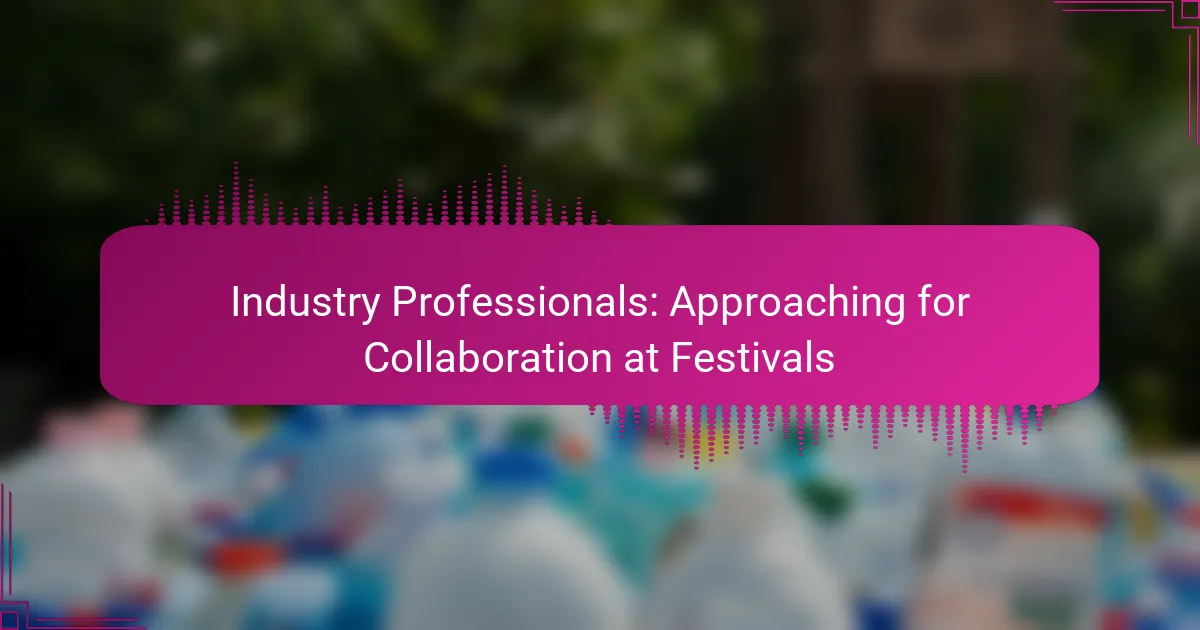Approaching industry professionals for collaboration at festivals requires careful preparation and a strategic mindset. By understanding your potential partners and articulating a clear value proposition, you can significantly improve your chances of forming successful collaborations that enhance your visibility and credibility in the industry.
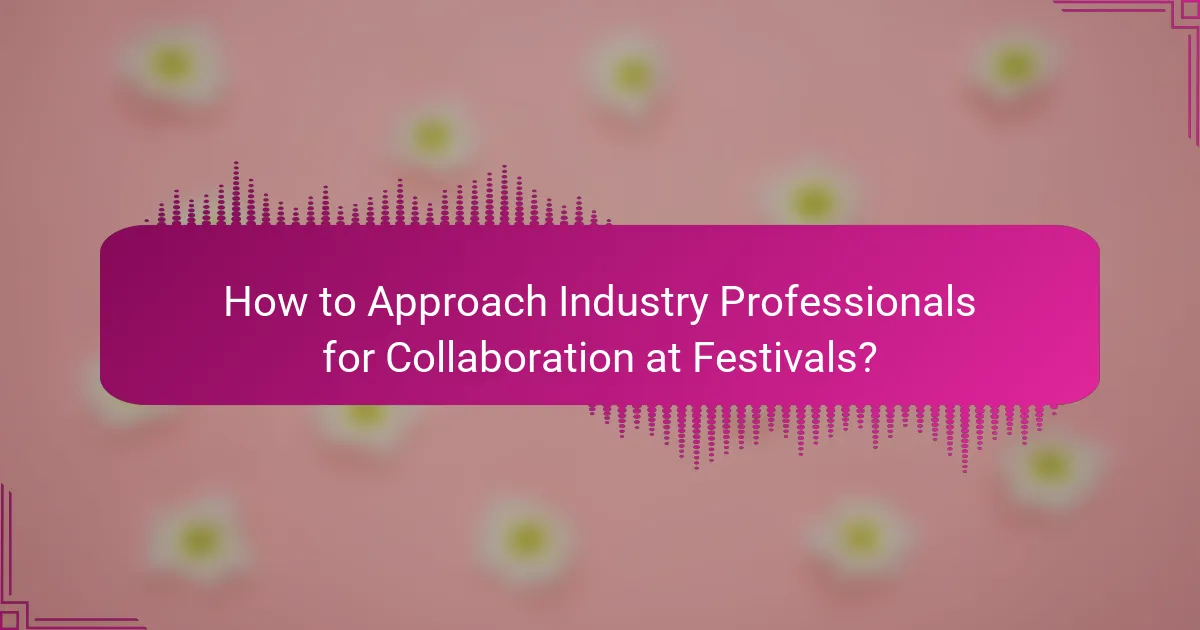
How to Approach Industry Professionals for Collaboration at Festivals?
To effectively approach industry professionals for collaboration at festivals, it’s crucial to be well-prepared and strategic. Understanding your potential collaborators and presenting a clear value proposition can significantly enhance your chances of success.
Research potential collaborators
Begin by identifying industry professionals who align with your goals and values. Look for individuals or organizations that have a history of collaboration or projects that resonate with your vision.
Utilize social media platforms, industry publications, and festival lineups to gather information about their work and interests. This knowledge will help you tailor your approach and demonstrate genuine interest in their contributions.
Craft a compelling proposal
Your proposal should clearly outline the benefits of collaboration for both parties. Highlight your unique skills, resources, or audience that you bring to the table, and explain how these can enhance the potential project.
Keep your proposal concise and focused, ideally no longer than one page. Use bullet points to emphasize key ideas and ensure that your main message stands out. A well-structured proposal can make a strong first impression.
Utilize networking opportunities
Festivals are prime environments for networking, so take advantage of every opportunity to connect. Attend workshops, panels, and social events where industry professionals gather.
Engage in conversations and be prepared to introduce yourself and your ideas succinctly. Building rapport in informal settings can lead to more meaningful discussions about potential collaborations later.
Follow up effectively
After your initial contact, it’s essential to follow up within a week. A brief email thanking them for their time and reiterating your interest in collaboration can keep the conversation alive.
Be polite and professional, and include any additional information that may strengthen your proposal. If you don’t receive a response, consider a second follow-up after another week, but avoid being overly persistent.
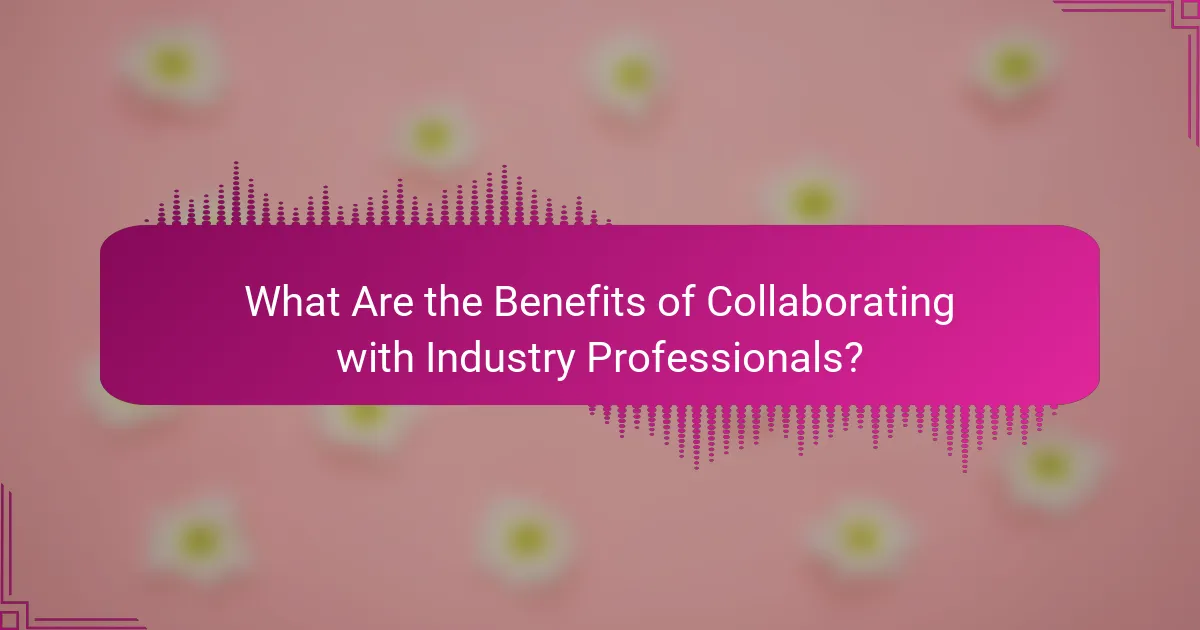
What Are the Benefits of Collaborating with Industry Professionals?
Collaborating with industry professionals at festivals offers numerous advantages, including increased visibility, access to new audiences, and enhanced credibility. These benefits can significantly impact your brand’s reach and reputation in a competitive market.
Increased visibility
Partnering with industry professionals can boost your visibility at festivals, allowing your brand to stand out among competitors. When you collaborate, your brand can be featured in promotional materials, social media posts, and event programs, reaching a wider audience.
Consider co-hosting events or workshops with established professionals. This not only draws their audience but also elevates your profile within the industry. Aim for collaborations that align with your brand values to maximize impact.
Access to new audiences
Collaborating with industry professionals opens doors to new audiences that may not be familiar with your brand. By leveraging their established networks, you can connect with potential customers who share similar interests.
For example, if you partner with a well-known influencer in your field, their followers may become interested in your offerings. Utilize social media and email marketing to engage these new audiences effectively, ensuring you tailor your messaging to resonate with them.
Enhanced credibility
Working alongside respected industry professionals enhances your credibility and trustworthiness. When you are associated with established figures, it signals to potential customers that your brand is reputable and worth their attention.
To maximize this benefit, choose collaborators who have a strong reputation and align with your brand ethos. Highlight these partnerships in your marketing efforts to reinforce your credibility and attract more customers.
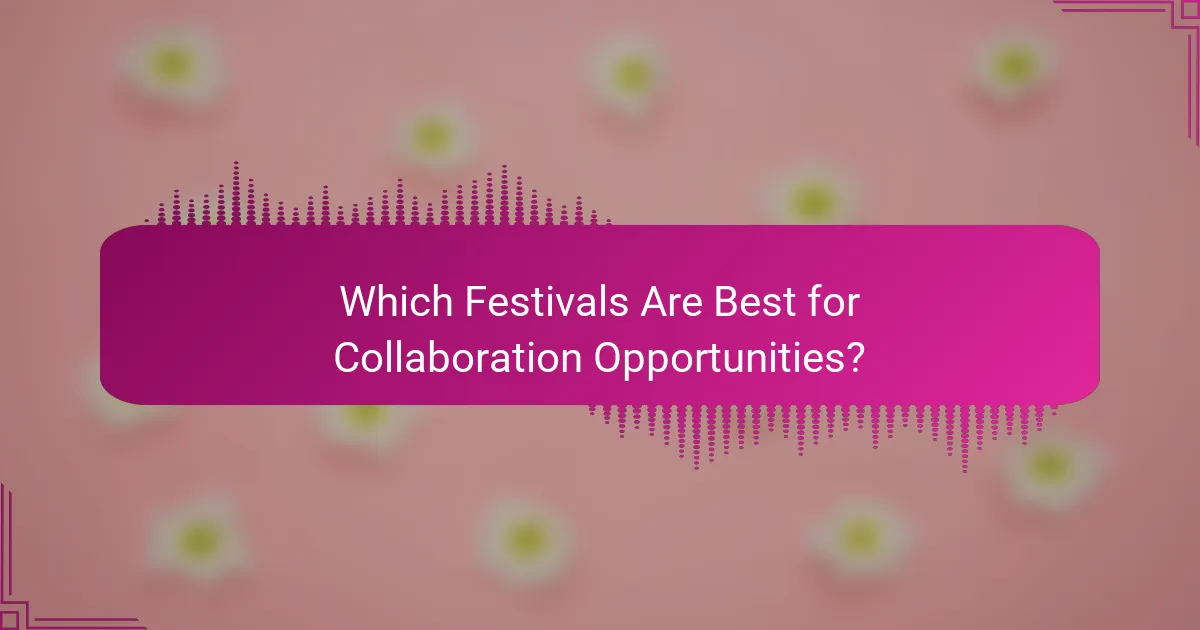
Which Festivals Are Best for Collaboration Opportunities?
Festivals that offer collaboration opportunities typically include industry-specific, regional, and major international events. These festivals provide platforms for networking, showcasing talent, and forming partnerships that can enhance professional growth.
Industry-specific festivals
Industry-specific festivals focus on particular sectors, such as film, music, or technology. These events are ideal for professionals looking to connect with others in their field, share ideas, and explore potential collaborations. For example, the Sundance Film Festival is a prime venue for filmmakers and distributors to network and negotiate deals.
When attending these festivals, consider preparing a portfolio or a pitch to showcase your work. Engaging in workshops and panels can also facilitate connections with like-minded professionals.
Regional festivals
Regional festivals highlight local talent and culture, making them excellent for networking within specific communities. These events often attract local businesses and artists, providing a more intimate setting for collaboration. For instance, the Edinburgh Festival Fringe is a great opportunity for performers and producers to connect within the UK.
To maximize your experience at regional festivals, research the attendees and plan meetings in advance. This proactive approach can lead to fruitful partnerships and collaborations tailored to the local market.
Major international festivals
Major international festivals draw participants from around the globe, offering vast networking potential. Events like the Cannes Film Festival or SXSW provide a platform for professionals to meet industry leaders, investors, and collaborators from various backgrounds. These festivals often feature panels, showcases, and networking events that facilitate meaningful connections.
When attending international festivals, be prepared to navigate diverse cultural norms and practices. Having a clear agenda and setting specific goals for collaboration can help you make the most of these expansive networking opportunities.
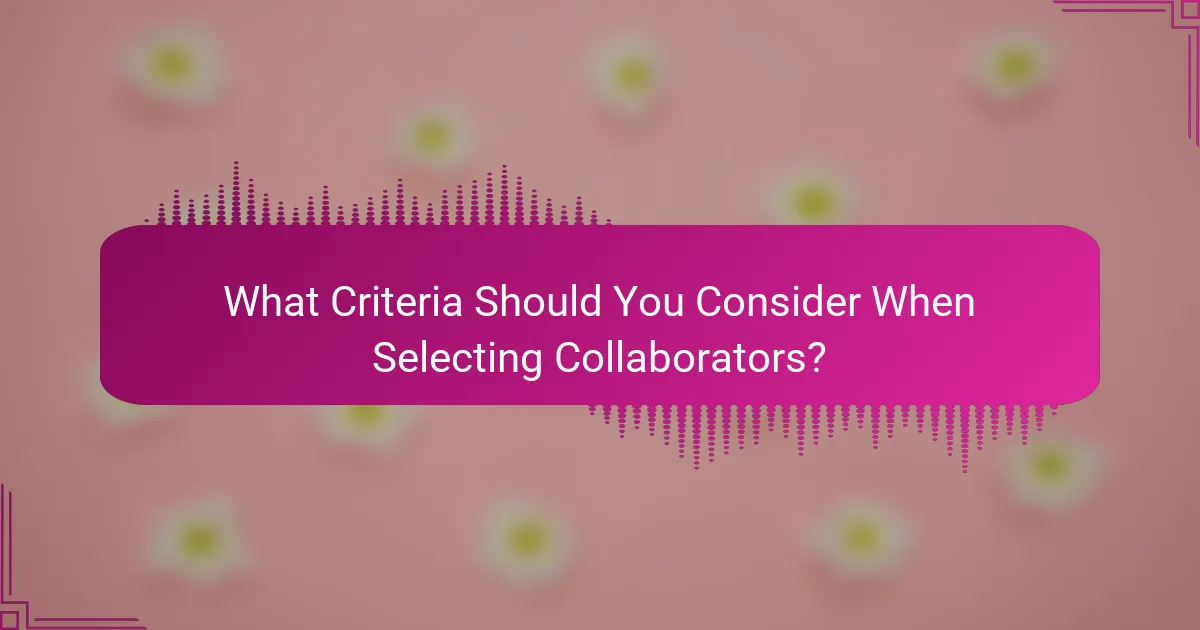
What Criteria Should You Consider When Selecting Collaborators?
When selecting collaborators for festivals, consider factors such as alignment of values, complementary skills, and previous collaboration success. These criteria ensure that partnerships are effective and mutually beneficial, leading to a more successful event.
Alignment of values
Alignment of values is crucial for successful collaboration. Partners should share similar goals, ethics, and visions for the festival, which fosters a cohesive working relationship. For instance, if your festival promotes sustainability, collaborating with organizations that prioritize eco-friendly practices can enhance your event’s credibility.
To assess alignment, discuss your core values openly during initial meetings. Look for signs of shared commitment, such as past initiatives that reflect similar principles. This alignment can significantly impact the overall atmosphere and message of the festival.
Complementary skills
Complementary skills among collaborators can enhance the festival’s overall quality. Identify partners who bring different strengths to the table, such as marketing expertise, technical skills, or artistic talent. For example, if you excel in event planning but lack technical knowledge, partnering with a skilled sound engineer can fill that gap.
When evaluating potential collaborators, create a skills matrix to visualize how each partner’s strengths complement one another. This approach helps ensure that all necessary areas are covered, leading to a more polished event.
Previous collaboration success
Consider the track record of potential collaborators in previous partnerships. Successful past collaborations can indicate reliability and a strong work ethic, which are vital for festival planning. Look for partners who have experience in similar events, as they are likely to understand the unique challenges and demands of festival environments.
Request references or case studies from potential collaborators to assess their past performance. This information can provide insights into their ability to meet deadlines, communicate effectively, and contribute positively to the festival’s goals.
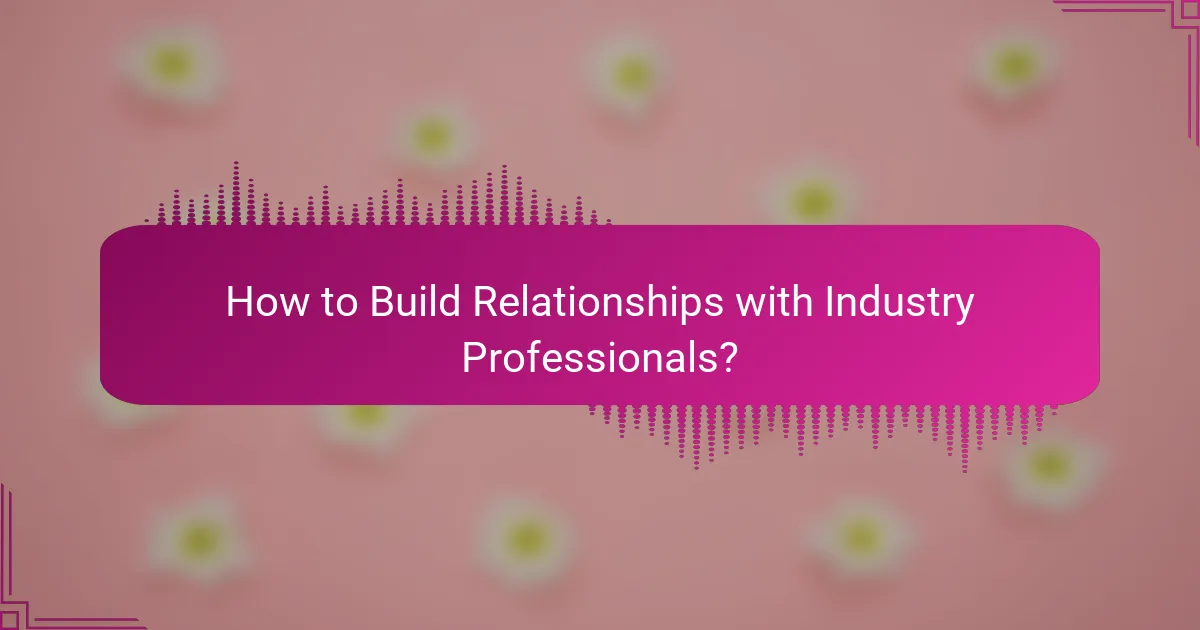
How to Build Relationships with Industry Professionals?
Building relationships with industry professionals involves proactive engagement, networking at events, and participating in relevant workshops. These strategies help establish connections that can lead to fruitful collaborations.
Engage on social media
Social media platforms like LinkedIn, Twitter, and Instagram are essential for connecting with industry professionals. Share relevant content, comment on posts, and participate in discussions to increase your visibility and demonstrate your expertise.
Consider following industry leaders and joining groups related to your field. Engaging with their content can lead to meaningful interactions and potential collaborations.
Attend industry events
Attending industry events such as conferences, trade shows, and festivals is a great way to meet professionals face-to-face. These gatherings often provide opportunities for networking, learning, and sharing ideas.
When attending, prepare by researching attendees and speakers. Bring business cards and be ready to discuss your work and interests. Follow up with new contacts after the event to solidify the relationship.
Participate in workshops
Workshops offer hands-on experience and the chance to collaborate with industry professionals in a focused setting. Look for workshops that align with your skills and interests to maximize your learning and networking potential.
During workshops, actively engage with both instructors and fellow participants. Sharing insights and asking questions can help you stand out and foster connections that may lead to future collaborations.
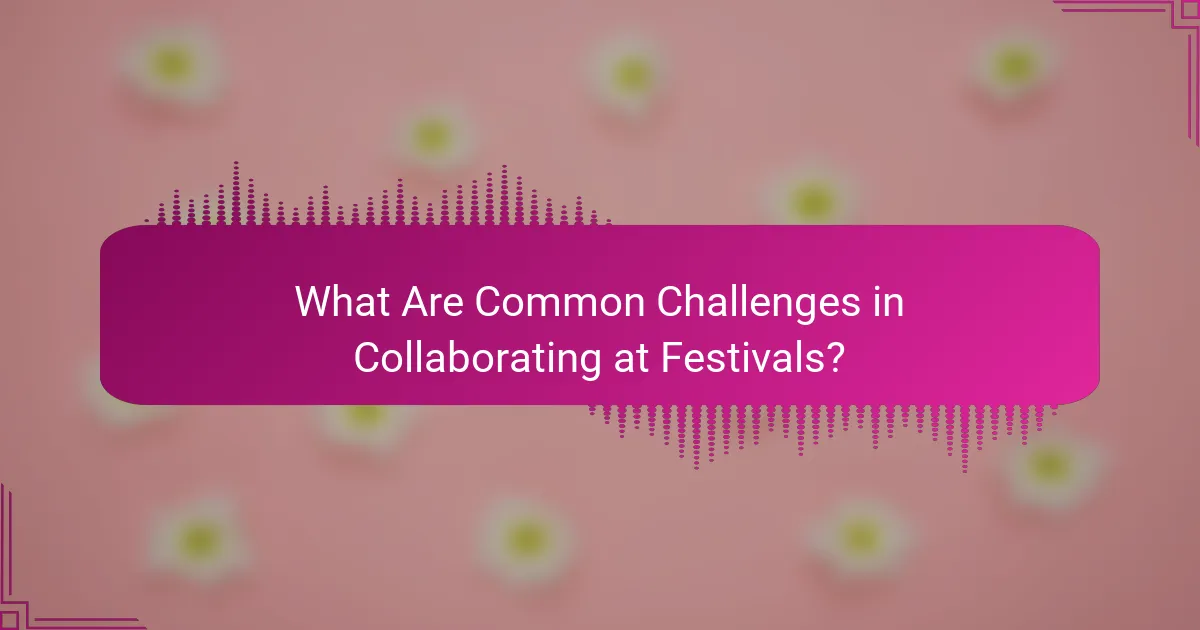
What Are Common Challenges in Collaborating at Festivals?
Collaborating at festivals can be challenging due to logistical issues, communication barriers, and differing goals among partners. These challenges can hinder the effectiveness of partnerships and impact the overall success of the event.
Logistical Issues
Logistical challenges often arise from coordinating schedules, securing necessary permits, and managing resources. For example, ensuring that all parties have access to the same equipment or venue space can be complicated, especially when multiple collaborators are involved.
To mitigate these issues, create a detailed timeline and checklist that outlines responsibilities and deadlines. Regular communication among partners can help identify potential conflicts early, allowing for adjustments before they become significant problems.
Communication Barriers
Effective communication is crucial for successful collaboration, yet it can be a major hurdle. Misunderstandings may occur due to different communication styles or cultural differences, particularly in international festivals.
Establish clear communication channels from the outset. Utilize tools like group messaging apps or project management software to keep everyone informed and engaged. Regular check-ins can also help ensure that all parties are aligned on goals and expectations.
Differing Goals and Objectives
Collaborators may have different objectives, which can lead to conflicts or misalignment. For instance, one partner might prioritize brand exposure while another focuses on audience engagement.
To address this, initiate discussions about each party’s goals during the planning phase. Create a shared vision document that outlines common objectives and desired outcomes. This can help ensure that all collaborators are working towards a unified purpose throughout the festival.
